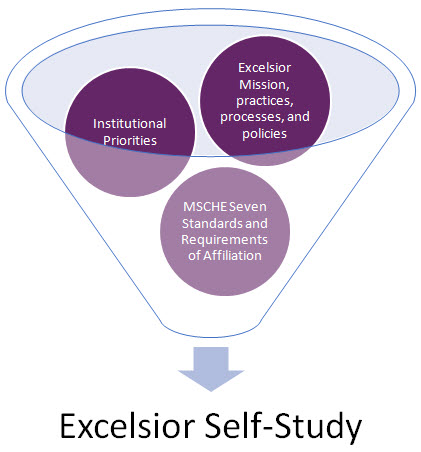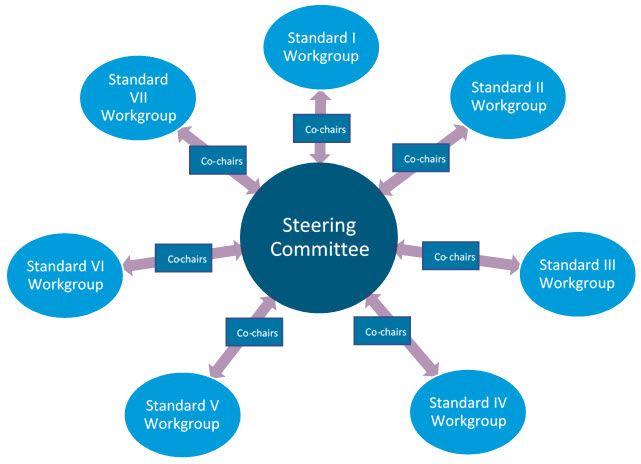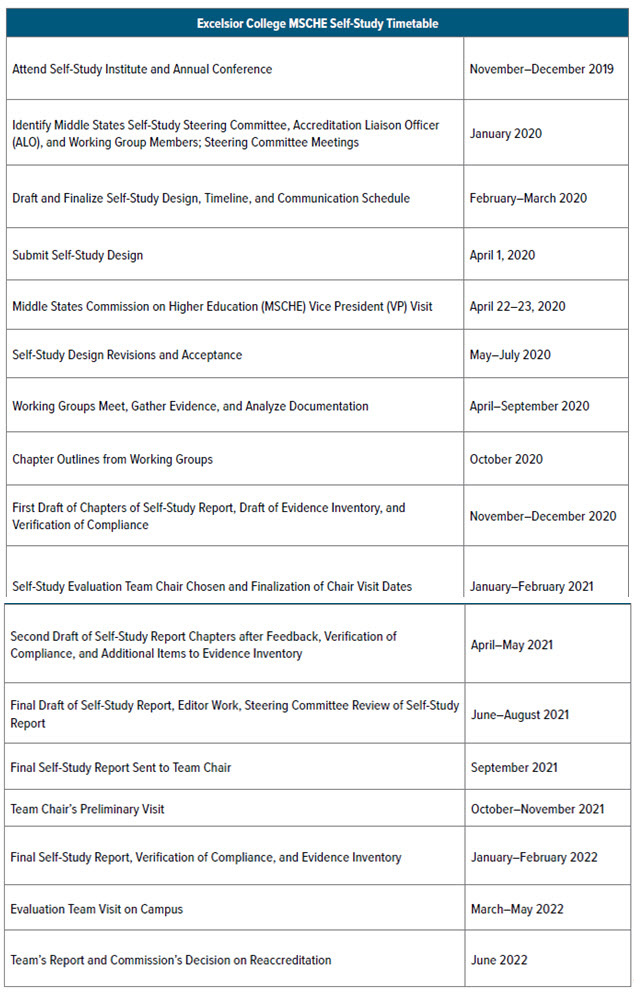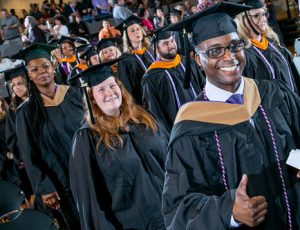Our MSCHE Accreditation Process
Excelsior University’s Middle States Self-Study Reaccreditation Report, Aiming Upwards, is available for the peer evaluation team as of February 2022. The team of peer evaluators, led by chair Dr. Richard Novak from Rutgers University, will conduct their virtual site visit from March 27-March 30, 2022.
Life Happens: We Keep Innovating
Accreditation by the Middle States Commission on Higher Education (MSCHE) is your assurance that Excelsior University adheres to stringent standards of educational excellence. A voluntary peer-based association, MSCHE serves as an accrediting body for over 520 institutions of higher education. MSCHE strives to promote excellence in education by setting standards of quality for institutions and providing a process for ensuring standards are implemented and followed. Excelsior University has been accredited by MSCHE since 1977.
Excelsior’s executive director of institutional outcomes assessment gives an overview of MSCHE and why reaccreditation is important.
Maintaining excellence requires an ongoing process of self-study, analysis, and implementation of identified opportunities for improvement. Every eight years, institutions of higher education go through a reflective self-study process as part of reaccreditation by MSCHE. Excelsior University is nationally known as one of the pioneers in distance education and contributes to the development of a diverse, educated, and career-ready society by valuing lifelong learning with an emphasis on serving individuals historically underrepresented in higher education. A key outcome of our reflective, self-study process is to differentiate ourselves and continue to enhance our position as an innovative leader in online higher education.
Listen to three Excelsior staff members discuss how Excelsior differentiates itself from the crowd as an innovative leader in online higher education.
We invite you to learn about our investment of time and talent devoted to self-study and the accreditation process.

Standard I: Mission and Goals
The institution’s mission defines its purpose within the context of higher education, the students it serves, and what it intends to accomplish. The institution’s stated goals are clearly linked to its mission and specify how the institution fulfills its mission.
Standard II. Ethics and Integrity
Ethics and integrity are central, indispensable, and defining hallmarks of effective higher education institutions. in all activities, whether internal or external, an institution must be faithful to its mission, honor its contracts and commitments, adhere to its policies, and represent itself truthfully.
Standard III. Design and Delivery of the Student Learning Experience
An institution provides students with learning experiences that are characterized by rigor and coherence at all program, certificate, and degree levels, regardless of instructional modality. All learning experiences, regardless of modality, program pace/schedule, level, and setting are consistent with higher education expectations.
Standard IV. Support of the Student Experience
Across all educational experiences, settings, levels, and instructional modalities, the institution recruits and admits students whose interests, abilities, experiences, and goals are congruent with its mission and educational offerings. The institution commits to student retention, persistence, completion, and success through a coherent and effective support system sustained by qualified professionals, which enhances the quality of the learning environment, contributes to the educational experience, and fosters student success.
Standard V. Educational Effectiveness Assessment
Assessment of student learning and achievement demonstrates that the institution’s students have accomplished educational goals consistent with their program of study, degree level, the institution’s mission, and appropriate expectations for institutions of higher education.
Standard VI. Planning, Resources, and Institutional Improvement
The institution’s planning processes, resources, and structures are aligned with each other and are sufficient to fulfill its mission and goals, to continuously assess and improve its programs and services, and to respond effectively to opportunities and challenges.
Standard VII. Governance, Leadership and Administration
The institution is governed and administered in a manner that allows it to realize its stated mission and goals in a way that effectively benefits the institution, its students, and the other constituencies it serves. Even when supported by or affiliated with governmental, corporate, religious, educational system, or other unaccredited organizations, the institution has education as its primary purpose, and it operates as an academic institution with appropriate autonomy.
To demonstrate our adherence to the seven standards, we developed institutional priorities to serve as a lens in guiding the evaluation of the evidence we collect and reflecting on opportunities for improvement.
- Demonstrate how the institution currently meets the Commission’s Standards for Accreditation, Requirements for Affiliation, and Accreditation-relevant Federal regulations for Verification of Compliance.
- Engage in the institutional community in an inclusive and transparent self-appraisal process that actively and deliberately seeks to involve members from all areas of the institutional community.
- Focus on continuous improvement in the attainment of the institution’s mission and its priorities.
- Continue to enhance our position as an innovative leader in online higher education through reflection on our identity and strategic direction.
We created institutional priorities to help us achieve our outcomes and demonstrate how we meet the seven standards and ways in which we can improve. The four priorities, derived from our mission and strategic goals are to:
- Develop an integrated ecosystem linking academic pathways, curricula, credentials, and credits.
- Implement a proactive, personal, and innovative CARES service system for students.
- Create and maintain an agile business model and enterprise system.
- Expand and diversify the student body through strategic marketing, branding, recruitment, and admissions.
Priorities 1 and 2 describe an intricate ecosystem: Integrating instructor-led and self-paced courses, Credit for Prior Learning (CPL), credit by exam, and stackable credentials with emerging technologies and virtual services to create a personalized and immersive educational experience. Priority 3 speaks to maintaining financial stability, serving our increasingly diverse students, prioritizing inclusive practices, and strategically investing in enterprise systems/pricing models that improve our operational responsiveness, flexibility, and financial stability. Priority 4 targets strategic growth and emerging markets to meet student needs and expand market share. We have and will continue to actively involve members from all areas of the Excelsior community to help ensure the self-appraisal process is inclusive and transparent, from beginning to end.

The general charge of the working groups is to:
- Determine to what extent the institution meets the working group standard and its criteria as well as identified requirements of affiliation.
- Develop two to three basic lines of inquiry that will both guide the examination of evidence for this standard and determine how effective Excelsior has been in meeting the standard.
- Analyze how the mission, vision, and strategic goals guide Excelsior’s planning and decision-making.
- Consider how institutional priorities as well as the intended outcomes are addressed in the working group standard.
- Review selected documents from previous MSCHE visits, becoming familiar with previous recommendations, reviews, and progress reports.
- Hold regular meetings (recording and archiving the minutes) in order to collect and examine relevant data, processes, and procedures for the working group standard.
- Identify, analyze and evaluate which evidence best supports the standard, determine if there are any gaps in the evidence, and select evidence that will be included in the Evidence Inventory.
- Demonstrate periodic assessment of the evidence and processes inherent in the standard and how such results were used for improvement.
- Identify the College’s strengths, challenges, and opportunities for improvement for the working group standard, recommend strategies for improvement, and implement strategies where feasible.
- Provide monthly reports to the Middle States Self-Study Steering Committee.
- Collaborate and communicate with related working groups from related standards to avoid duplication of effort.
- Develop draft reports and incorporate feedback into a final report for the working group standard according to established timelines.
Review the membership of the Excelsior University Middle States Steering Committee and working groups.

 Make improvements!
Make improvements!
The self-study allows us to reflect on our strengths and determine any opportunities for improvement and innovation that will advance our mission and improve the success of our graduates. We will use the information from our self-study to inform our strategic planning process and make necessary changes to improve our institution.